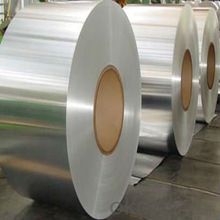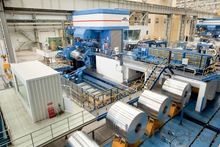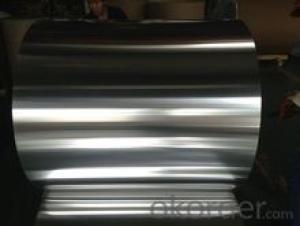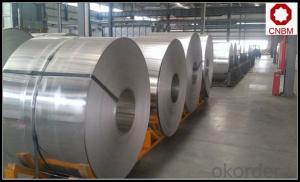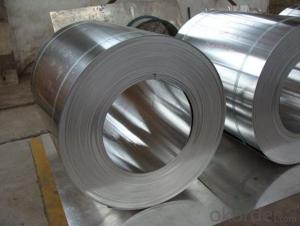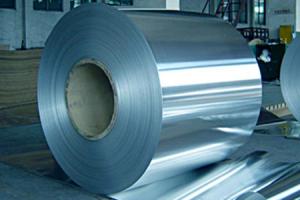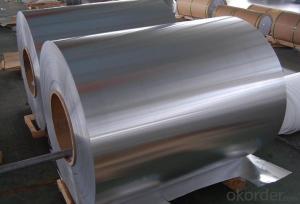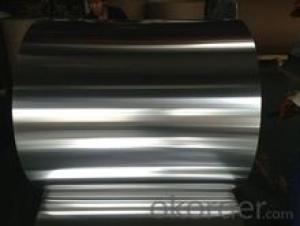Brown Aluminum Coil Stock - CNBM 0.3mm-6.0mm Thickness Mill Finish Aluminium Coil 1050 H24
- Loading Port:
- Qingdao
- Payment Terms:
- TT OR LC
- Min Order Qty:
- 200 set
- Supply Capability:
- 300000 set/month
OKorder Service Pledge
OKorder Financial Service
You Might Also Like
Quick Details
| Place of Origin: | China (Mainland) | Brand Name: | cnbm | Model Number: | A1050 |
| Application: | appliance, construction | Thickness: | 0.3-150mm | Width: | 300-1600mm |
| Alloy Or Not: | Non-alloy | Grade: | 3000 Series | Surface Treatment: | Embossed |
| Temper: | O - H112 | Certificate: | ISO9001:2008, SGS | Surfaced: | mill finish |
| Processing: | CC and DC | sample: | free and fast | Shipment type: | 20' or 40' container |
Packaging & Delivery
| Packaging Detail: | 1.stamdard export seaworth wooden pallet packing. 2.other packing methods by customer's requirement. |
| Delivery Detail: | Within 30days after the seller receive advance payment |
Specifications
aluminium coil 1050 H24
Alloy:1200,1100,3003 so on
Thickness: 0.3-150mm
Width: 300-1600mm
ASTM EN Standard
Product Description
Product Detail: Aluminium coil 1050
Alloy | Temper | Thickness (mm) | Width (mm) | Internal Diameter (mm) | Remarks |
1100 1050 1060 1070 | O H12 H22 H14 H24 H18 H32 etc. | 0.2-4.0 4.0-20.0 | 300-1550 | 500 150 75 | Products’ various specifications by caustmoers,requirement |
3003 3105 | |||||
8011 | |||||
5005 5052 5083 |
3.Tolerance: Thickness: (+/-0.02mm)
Width:(+/-1mm)
Length:(+/-1mm)
4.Application:
Building Material , Insulation, Shoes &Tents Eyes,Corner Beads,Automotive Industrial, POP Can Bottle
and Cap,Deep-Proceeding Case,light industry, TV back board,Street Sign, PP caps, Cell mask and so on.
5.Surfact Quality :
be free from Oil Stain, Dent, Inclusion, Scratches, Stain, Oxide Dicoloration, Breaks, Corrosion, Roll Marks,
Dirt Streaks and other defect which will interfere with use
6.Mechenical Property:
Chemical Composite and Mechanical Property are meted with GB/T, ASTM, ENAW, JIS Standard
7.Packing:First, plastic cloth; Second, Pearl Wool ; Third, wooden cases with dry agent ,without fumigation,
wooden pallets
8.Certificate: ISO9001:2008, SGS and ROHS(if client request, paid by client), MTC(plant provided),
Certificate of Origin(FORM A, FORM E, CO)
9.Month Capacity: 10000MT/Month
10.Trade Terms: EXW,FOB,CIF ,DAP
- Q: Are aluminum coils affected by magnetic fields?
- Yes, aluminum coils can be affected by magnetic fields to a certain extent. Aluminum is a non-magnetic material, meaning it does not possess any inherent magnetic properties. However, when exposed to strong magnetic fields, aluminum can experience an induced magnetic field due to a phenomenon called electromagnetic induction. This can result in a slight attraction or repulsion between the aluminum coil and the magnetic field, although the effect is generally weaker compared to materials with magnetic properties, such as iron or steel. It is important to note that the degree of interaction between aluminum coils and magnetic fields depends on several factors, including the strength and proximity of the magnetic field, the shape and size of the coil, and the specific composition of the aluminum alloy used in the coil.
- Q: What are the thermal expansion properties of aluminum coils?
- The dimensions of aluminum coils change with temperature variations, which is known as their thermal expansion properties. Aluminum has a relatively high coefficient of thermal expansion, causing it to expand and contract more than other materials when exposed to temperature changes. The coefficient of thermal expansion for aluminum is approximately 22.2 x 10^-6 per degree Celsius. This means that for every degree increase in temperature, the length, width, and thickness of the aluminum coils will increase by around 22.2 parts per million. Conversely, when the temperature decreases, the coils will contract accordingly. These thermal expansion properties have significant implications in various applications that involve the use of aluminum coils. For instance, in heating and cooling systems, it is crucial to carefully consider the expansion and contraction of aluminum coils caused by temperature changes to ensure proper functioning and prevent damage. Likewise, in construction, where aluminum coils are commonly used for roofing and cladding, understanding their thermal expansion properties is vital to avoid structural issues and maintain the building's integrity. It is worth noting that the coefficient of thermal expansion may slightly differ depending on the specific aluminum alloy used in the coils. Furthermore, factors like coil thickness and shape can also affect the thermal expansion behavior. Therefore, when working with aluminum coils, it is advisable to refer to the material specifications or seek guidance from experts to accurately determine the thermal expansion properties and incorporate them into the design and application processes.
- Q: Is it advisable to use a hammer to open a stuck aluminum coil?
- <p>Using a hammer to break open an aluminum coil that is stuck closed is not recommended. Aluminum is a soft metal and can be easily damaged by blunt force. Instead, try using pliers or a screwdriver to gently pry open the coil. If the coil is rusted or stuck due to other reasons, applying a penetrating oil or lubricant might help loosen it without causing damage. Always prioritize safety and the preservation of the material when attempting to open or unstick objects.</p>
- Q: What is the thickness range of aluminum coils?
- The thickness range of aluminum coils can vary depending on the specific application and industry. However, typically, the thickness range for aluminum coils is between 0.006 to 0.25 inches (0.15 to 6.35 mm). This range allows for a wide variety of uses, from thin and lightweight applications such as packaging materials or electrical components, to thicker coils used in construction or automotive industries. It's important to note that these are general ranges and the specific thickness requirements may vary based on the intended use and customer specifications.
- Q: What is the typical thermal conductivity of aluminum coils?
- The typical thermal conductivity of aluminum coils is around 205-230 W/mK.
- Q: Can aluminum coils be used in kitchen appliances?
- Kitchen appliances can indeed utilize aluminum coils. Due to its remarkable thermal conductivity and resistance to corrosion, aluminum is extensively employed in the production of kitchen appliances. It finds frequent application in refrigerators, air conditioners, and other devices that necessitate efficient heat transfer. Lightweight and enduring, aluminum coils effectively disperse heat, rendering them ideal for a wide array of kitchen appliances.
- Q: How does the gauge of aluminum coils affect their performance?
- The thickness of the aluminum sheet used to make the coil determines the gauge of aluminum coils. The gauge is typically measured by its thickness, with a smaller gauge indicating a thicker sheet. The performance of aluminum coils is significantly influenced by their gauge. To begin with, the strength and durability of the aluminum coil are affected by the gauge. Thicker gauges offer greater strength and resistance to bending or warping, making them suitable for applications that require sturdy and long-lasting coils. Conversely, thinner gauges are more flexible but may be prone to damage or deformation, making them suitable for less demanding applications. Furthermore, the gauge affects the thermal conductivity of the aluminum coil. Thicker gauges have lower thermal conductivity, resulting in slower heating or cooling. This characteristic can be advantageous in applications where precise temperature control is crucial, as it helps maintain a stable environment. On the other hand, thinner gauges have higher thermal conductivity, enabling faster heat transfer. This can be beneficial in applications that require rapid heating or cooling. Moreover, the gauge affects the weight and cost of the aluminum coil. Thicker gauges are heavier and generally more expensive due to the increased amount of material required. This factor is important to consider in applications where weight or cost plays a significant role. Thinner gauges, being lighter and less expensive, are more suitable for applications that prioritize weight reduction or cost efficiency. Lastly, the gauge influences the ease of fabrication and formability of the aluminum coil. Thinner gauges are more easily bent, shaped, or formed into desired configurations, making them suitable for applications that involve intricate or complex designs. Although thicker gauges are less malleable, they can still be formed with specialized equipment or processes. In conclusion, the gauge of aluminum coils directly affects their performance. It influences their strength, durability, thermal conductivity, weight, cost, and formability. Therefore, selecting the appropriate gauge for a specific application is crucial to ensure optimal performance and efficiency.
- Q: Describe the manufacturing steps involved in producing aluminum coils.
- <p>The production processes of aluminum coils involve several key steps. Initially, aluminum ingots are melted in a furnace. The molten aluminum is then transferred to a casting machine where it is cast into a continuous strip. This strip is cooled and passed through a series of rollers to reduce its thickness and achieve the desired coil gauge. The rolling process can be hot or cold, depending on the final product's properties. After rolling, the aluminum coil may undergo annealing to improve its ductility and strength. It is then cleaned, oiled, and wound into coils. Quality control checks are performed throughout the process to ensure the coils meet specific standards. Finally, the aluminum coils are packaged and shipped for various applications such as construction, automotive, and packaging industries.</p>
- Q: Roll presented above 1 complete circles are brineling put on work roll after the new rolling, less than 12 volumes in the aluminum surface will be presented in the corresponding position of a straight roller, a roller indentation in the above, check the work roll above a pit. Replace the upper support roll for only a few days. Want to know what's going on?Should not be bearing problems, because the bearings have been used for almost 4 years, it should not be bearing problems, and now they are suspected of bending cylinder seal problems, oil seepage phenomenon.
- Substandard products how to leave the factory, if not for external reasons, that is, when the design and installation of bearings, specifically, you find manufacturers to come to repair
- Q: Are aluminum coils suitable for food storage containers?
- Yes, aluminum coils are suitable for food storage containers. Aluminum is a non-toxic and non-reactive metal that is safe for storing food. It is lightweight, durable, and has excellent temperature retention properties, making it a popular choice for food storage containers.
Send your message to us
Brown Aluminum Coil Stock - CNBM 0.3mm-6.0mm Thickness Mill Finish Aluminium Coil 1050 H24
- Loading Port:
- Qingdao
- Payment Terms:
- TT OR LC
- Min Order Qty:
- 200 set
- Supply Capability:
- 300000 set/month
OKorder Service Pledge
OKorder Financial Service
Similar products
Hot products
Hot Searches
Related keywords


